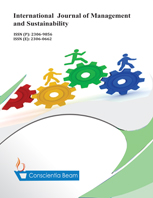Evaluating the impact of organizations’ corporate social responsibility from the banking industry perspective: A fuzzy analytic hierarchy process approach
DOI:
https://doi.org/10.18488/11.v12i2.3331Abstract
The purpose of this study is to evaluate the impact of corporate social responsibility (CSR) from economic, employee, social and environmental dimensions in a hypothetical company setup. This study employs the fuzzy analytic hierarchy process (FAHP) in which the elements of the pairwise comparison matrix are expressed by triangular fuzzy elements. Furthermore, the classical non-fuzzy methods, such as the eigenvector and geometric mean, were also employed to calculate the weights of the fuzzy comparison matrices. First, some existing literature on CSR and its impact on the internal and external environments were explored. Second, the FAHP goal and the criteria were established, and this was followed by the pairwise comparison using the linguistic scale. Next is the computation of the geometric magnitude and weight of each criterion. Thereafter, the defuzzified and normalized weights were obtained. In the order of priority of CSR activities and their impact on the four identified criteria, alternative 1 (company 1) is ranked first, followed by alternative 2 (company 2), and alternative 3 (company 3) is ranked last. The implementation of CSR activities for companies 1 and 2 reflect positively in their internal and external environments, although to varying degrees. This study provides a practical guided approach for the use of the FAHP for solving a multi-criteria decision, such as ranking the impact of CSR activities in relation to certain criteria. The outcome of this study can guide organizations in making informed decisions regarding the implementation of CSR activities.

